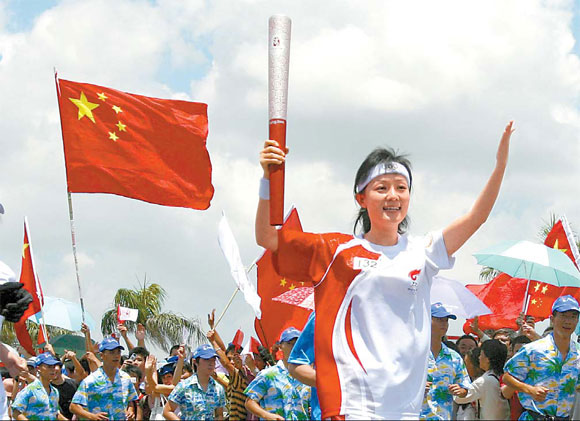 Lu Haiying, a journalist and the last torchbearer of the Olympic torch relay in Haikou, capital of Hainan province, arrives at the finish yesterday. [China Daily]
Lu Haiying, a journalist and the last torchbearer of the Olympic torch relay in Haikou, capital of Hainan province, arrives at the finish yesterday. [China Daily] |
The Olympic torch will cross many Chinese cities, but there is something different about its passage through Haikou.
The city was declared the capital of Hainan province when it was separated from its parent province of Guangdong in April 1988. That makes Haikou the youngest provincial capital in China.
But that does not mean human settlement in Haikou is new too. The first recorded human settlement in the city was during the Han Dynasty (206 BC - AD 220). And since then people have been coming to Haikou, with some making it their home.
Of late, the city has seen many of its residents using Putonghua instead of the Haikou dialect as their medium of communication. That's because the number of immigrants from the mainland has reached about 320,000, more than one-fifth of the city's population.
Haikou Party chief Chen Ci put the city's position in perspective when the Olympic torch reached the provincial capital yesterday. "The Olympics is a gathering of people from different countries and regions. This is very similar to the idea behind building the city of Haikou, a melting pot of people from across China" and the world.
The city on the Qiongzhou Straits in northern Hainan celebrated its 20th year as the provincial capital on April 26, with more than 1,500 guests attending a special ceremony.
Immigrants come to Haikou today either to work or set up business. But the early immigrants did so for something more: In search of a better life.
"There was faith in the future (which we were determined) to build for ourselves in Haikou," said Hu Bin, a resident of the city for the past 20 years.
He was one of the thousands of talented people who reached Haikou from the mainland in the late 1980s.
The 47-year-old writer was born in Anhui province, where he came to know that a new province would be carved out of Guangdong in 1988. He quit his job as a radio host in Anhui immediately and boarded a ship to Haikou.
"We put everything behind and came to Hainan, and Hainan is our future," he told the local media recently. Hu is now a senior member of the Hainan Writers' Association and considers himself a Haikou native.